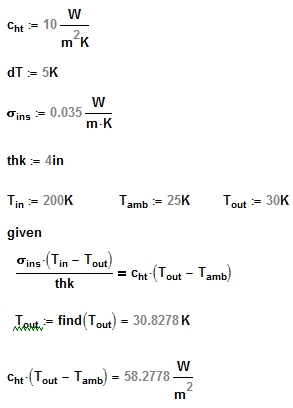Hi All:
I'm designing a 5000 gallon liquid wax holding vessel. The vessel will jacketed with hot oil flowing through it to maintain 200 Deg C inside the vessel. The tank will also be insulated. I'm trying to figure out the heat load consumption on hot oil and hot oil flowrate through the jacket. I'm thinking that, if I can calculate heat loss through the tank (assuming no hot oil jacket) then the amount of heat loss will be hot oil load to maintain the temperature of 200 Deg C
I've used the simple formula Q = U x A x delta T where U is the heat transfer rate in Btu/hr-ft2-Deg F and I've assumed it to be 2 (rate of heat transfer through the vessel in air) The surface area is 347 ft2 and the delta T is 315 deg F
The above formula gave me a big number 218,000 btu/hr
Does this sounds right?
Is there another way to verify this number?
Thanks
Pfluid
I'm designing a 5000 gallon liquid wax holding vessel. The vessel will jacketed with hot oil flowing through it to maintain 200 Deg C inside the vessel. The tank will also be insulated. I'm trying to figure out the heat load consumption on hot oil and hot oil flowrate through the jacket. I'm thinking that, if I can calculate heat loss through the tank (assuming no hot oil jacket) then the amount of heat loss will be hot oil load to maintain the temperature of 200 Deg C
I've used the simple formula Q = U x A x delta T where U is the heat transfer rate in Btu/hr-ft2-Deg F and I've assumed it to be 2 (rate of heat transfer through the vessel in air) The surface area is 347 ft2 and the delta T is 315 deg F
The above formula gave me a big number 218,000 btu/hr
Does this sounds right?
Is there another way to verify this number?
Thanks
Pfluid

